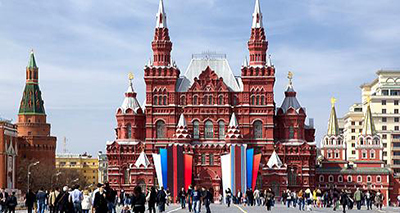
Source: www.studymedicalmbbsinrussia.co.in
I am now a 4th year medical student in Kursk, Russia. From the moment I stepped into the land we fondly refer to as “Mother Russia”, I had a feeling that it would change my life. I was embarking on a life changing journey, one that would involve engaging in various life missions. Being a medical student in a foreign country, I tried to adapt to the local lifestyle while trying to experience as much as I could, especially when trying to learn the language of this culturally diverse nation.
Those who are studying or have studied in Russia are probably immune to hearing various comments which include “Russia? Are you mad? It’s freezing cold there!” and let us not forget the occasional remarks; “Russians are rude, they do not like foreigners and Russian medical graduates practically know next to nothing”. I have heard of the struggles of my seniors during their housemanship. The difficulty some are facing is definitely terrifying as I fear that I too would be subjected to ridicule and hostility upon returning home. I constantly doubted my decision to pursue my medical education in Russia to the extent where I almost called it quits. It took a few days of self-reflection for me to get back on track and continue my studies.
Being in a predominantly Russian speaking country, I obviously had to be able to converse in the language as the majority of people were only able to say a few English phrases; “Hello, how are you, very good, thank you” was all we got. I could definitely relate to their predicament as I still remember the struggle my friends and I had during our early days there. We tried to communicate with body language as we only knew a few basic Russian phrases without being able to construct proper sentences.
In addition to that, not many of our lecturers were comfortable with conversing in English. Therefore, it was quite challenging for us to clarify doubts during classes as there was a communication barrier. Nevertheless, once we overcame this barrier, we were able to communicate better with our lecturers, peers and the Russians in general. Although we have heard many say that Russians are a harsh and unfriendly lot, especially the old folks, I beg to differ, once we were able to overcome the language barrier, it was quite fine. The locals warmed up to us and even started learning English as they wanted to be able to communicate with us better.
Unfortunately, the happiness was short lived as the moment we began our clinical years, things became more complicated. Dealing with patients purely in Russian was extremely difficult. As we were expected to do everything in Russian, from clerking, to preparing case notes and presenting. There was one occasion in which I clerked a 74 year old Russian lady with an underlying history of Chronic Obstructive Pulmonary Disease (COPD). Although she could not converse in English and was hearing impaired, she was very cooperative. We continued to clerk her and perform physical examinations.
Third year was definitely a challenging one, with all the practical skills classes, exams, handwritten case summaries, fierce lecturers and intimidating deadlines, we were practically losing our minds. More so when we were facing exams but were always distracted by the fact that we would be heading home right after the exams.
Now, I am a 4th year medical student. Our classes are mostly conducted in the hospital which is far from our university. Obstetrics, Therapy, and Surgery are the 3 killer subjects of the year. Inadequacies continue to haunt us as communication and rapport building is not as easy as it seems for some of us. When patients are uncooperative, we eventually have to face the music from our Professors for not being able to build rapport.
We realized that our old habits of blurting out a random diagnosis without proper history and examination was definitely unacceptable. Between decoding the complicated handwritings of doctors and interpreting the Russian language while reading the patient’s case note and searching high and low for ways to find cooperative patients, it was quite an adventure.
By the time we reach home, nothing seems more interesting than a good slumber on a comfy bed. These various experiences are one’s that have helped shaped who I am today, a medical student, eager to become a good doctor.
To those who doubt the Russian students, or question our decision to study in Russia, I would just like to say, to each, his own, and I pray that God will give me the strength to carry on. To my peers, please learn the medical theory well, catch up and always refresh your knowledge, develop thick skin, and grab the opportunity to do your elective posting in Malaysia and learn as much as you can. You will meet a few naysayers along the way, but keep calm and carry on. Learn from mistakes and do well in practical skills. Life as a medical student is like a roller coaster, but I am definitely enjoying my ride so far.
D’Dyanna Lajamin is a 4th year Sabahan medical student currently studying in Kursk State Medical University, Russia. Know more about her under the Young Columnist tab.
